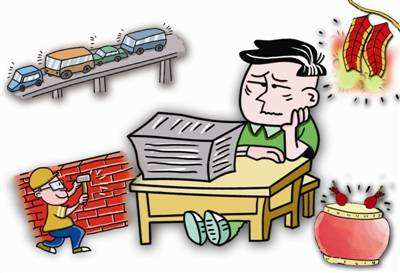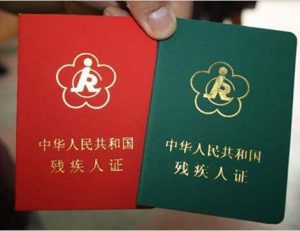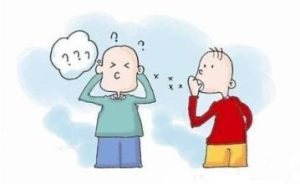“I am so afraid of loud, I have no problem with my hearing. Will the sound be loud when I check? I can’t stand it.” This is an occasional question in the hearing room. There is no problem with hearing. The people around you don’t feel very loud, but some people think that “the magic sound is wearing the brain” and “deafening”. It seems that all the sounds of the whole world are adjusted to the loudest sound, and the ears and the head are fast. Exploded. Even the sound of reading newspapers, the sound of the faucet in the kitchen sink, the sound of stainless steel cutlery into the sink, the sound of the washing machine, the refrigerator, the crying of the baby, the sound of the dish colliding with the table, etc. It will make him (her) unable to stand it, and the high-pitched voices such as the doorbell, the phone call, and the car’s emergency brakes make him or her crazy! Therefore, patients with severe allergies must wear even when brushing their teeth. Earplugs (hoods), you can get away from the crowd when you walk, but even if you move to the top of the mountain or the sea, you will feel the wind, the sound of birds or the sound of the waves are too annoying! Finally, the end I am trapped in heavy airtight windows, curtains, earplugs, and industrial earmuffs, and I can’t get out of the “secret room”, let alone social life and career development!

What is hyperacusis?
Hearing allergy means that there is no way to endure the sounds of everyday life. It can be said that normal people don’t sound loud, and people with hearing allergies can’t stand it, and even feel the pain in the ears. Often the most painful people feel the pain of sudden high-pitched noises such as sirens, emergency brakes, children’s screams and applause. Sometimes, people with hearing allergies can be serious enough to start escaping from any public and social activities to protect their ears. Hearing sensations can be sudden, such as taking part in a heavy metal concert or shaking head party, shooting, airbag blasting, fireworks show or bee cannons, or slowly forming such as long-term exposure to noise. surroundings. Some patients may have only one ear at the beginning, but soon after, most of them are almost all. There are different degrees of difference: mild, moderate, and severe. About 90% of people with hearing allergy are accompanied by annoying tinnitus, but no hearing loss. 5 people have hearing allergies about every 1 people, but 1 people have hearing allergies among every 1 people who have tinnitus. Adults and children may be born. Although hearing allergies don’t kill people, they are also enough to swear!
What causes hearing allergies?
Although hypersensitivity is only a symptom, and its etiology is diverse, it can be found in the following diseases: for example, in the peripheral auditory system, including: Bell’s palsy, herpes zoster (Ramsay Hunt) Syndrome), temporomandibular joint syndrome, noise damage, Meniere’s disease, otologic surgery, especially stapedectomy, perilymphatic fistula, etc. In the central nervous system, including: migraine, depression, head injury, William’s syndrome, learning disabilities, autism and extensive developmental disorders, spinal anesthesia, multiple sclerosis, etc. In hormones and infectious diseases such as: Addison’s disease and neurosyphilis, as well as unknown causes and so on. Although the real mechanism of hearing allergy is still unknown, the vast majority of researchers believe that the brain’s function of the regulation mechanism of sound is a problem.
How is it good when you have hearing allergies?
Don’t be loud, “quiet and silent” is not a good thing!
Once you have hearing allergies, the ability to endure the sound will increase or decrease over time. The key factor is whether it is continuously exposed to high-pitched noise. For patients who are already hypersensitivity, appropriate education is required immediately. The average person encounters sudden sounds such as whip and explosion, and instinctively picks up his ears to hide. Of course, as much as possible to avoid exposure to high-pitched noise, it is necessary to wear earplugs or earmuffs in a timely manner. However, patients with hypersensitivity often wear earplugs or earmuffs at all times to reduce the sound of the outside world. In the long run, this will not improve the symptoms of hearing allergy, and it will lead to more deterioration. Because earplugs or earmuffs will cause the central auditory system to increase its gain value, it will make its hypersensitivity more sensitive and create a vicious circle. As of now, no drug or surgery can cure allergies. Nowadays, the “tinnital desensitization therapy” recommended by otolaryngologists at home and abroad is more effective in relieving this symptom. In addition to giving patients a consultation, the tinnitus desensitization therapy recommends that patients use a “desensitizing sounder” – a hearing aid similar in appearance, with low volume, wide-band noise, and long-term wear, will gradually make the ear sound “Go sensitive” to increase the tolerance for sound. Although this method cannot be completely cured, it will gradually improve.
Who should I ask for help?
Ask an otolaryngologist for help in identifying possible causes and excluding those who can be treated or improved by medical treatment such as temporomandibular joint syndrome, Meniere’s syndrome, etc. Afterwards, the complete medical team members, in addition to otolaryngologists, audiologists, psychiatric specialists, clinical psychologists, etc., will be able to provide a complete examination and treatment plan to help patients with hearing allergies regain their joy. Take a secret room and go to a colorful and colorful life!!!
Link:Is hearing also allergic?
REF: Hearing Aids Supplier , Bluetooth Hearing Aids, Hearing Aids TypesThe article comes from the Internet. If there is any infringement, please contact [email protected] to delete it.



